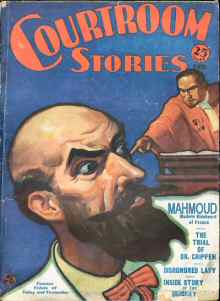 [Dawn] Two US citizens of Pakistani origin were sentenced Monday to 17 and 13 years in prison for conspiring to support terror groups by videoing American landmarks and sending the tapes abroad.
[Dawn] Two US citizens of Pakistani origin were sentenced Monday to 17 and 13 years in prison for conspiring to support terror groups by videoing American landmarks and sending the tapes abroad.In the latest of a spate of cases that have raised fears that radicalization is gaining momentum in the United States, Judge Willam Duffey was scathing in his final remarks in the courtroom in Atlanta, Georgia. 'I'll say this, our Gods are very different,' Duffey told the first to be sentenced, Ehsanul Islam Sadequee. 'This is a day of reckoning for you, Mr. Sadequee. This is to deter you and to deter others from this conduct.'
Sadequee, 23, refused to stand when Duffey, a former US attorney, asked him several times to do so. The judge had allowed him almost 45 minutes to explain why a harsh sentence should not be imposed, but the convicted terror plotter instead used the time to explain his religious beliefs. 'I have not and I will not request any sentence,' said Sadequee. 'It does not matter to me. I submit to no one's authority but to the authority of God.'
Sadequee's friend and fellow Georgian Syed Haris Ahmed, a former student at Georgia Tech University, was sentenced to 13 years for conspiring to provide material support for terrorism in the US. Duffey admonished Ahmed in court for not taking responsibility for his actions and suggested that he could have received a lighter sentence if he had repented. 'You and others have distorted the values of your faith. You are a myopic, self-interested person,' the judge said.
Ahmed, 24, a thin man, slightly built, tried to interrupt Duffey during sentencing, but the judge scolded him and said, 'the time for speaking is over, the time of reckoning is now.'
Both Sadequee, who was born in Fairfax, Virigina and Ahmed, who moved to the US in the mid-1990s, were also sentenced to 30 years of supervised release following their jail time.
Ahmed and Sadequee were found guilty, in June and August respectively, of supporting terror groups by videotaping US landmarks, including the US Capitol and the headquarters of the World Bank, and sending the tapes overseas.
During the trial, prosecutors said the pair developed relationships over the Internet and maintained contact online, along with other 'supporters of violent jihad' in the United States, Canada, Britain, Pakistan, Bosnia and beyond.
| If we know where they are, we probably have a good idea who they are... not to mention tracing down their contacts, too. Well done, O Invisible Good Guys! |
| To Bangladesh? I s'pose someone is going to blame the American school system for that egregious error of geography. |
'The radicalization of US citizens by jihadist recruiters abroad is a very real and growing concern that the FBI and the US government as a whole must deal with,' FBI Atlanta Special Agent Greg Jones said on Monday.
'The risk posed by men such as these defendants continues, both here and abroad,' Acting US Attorney for the Northern District of Georgia Sally Quillian Yates said, reacting to Monday's sentences for Ahmed and Sadequee. 'Hopefully, meaningful sentences such as these will make our citizens and our soldiers safer around the world as the message is sent that we will vigorously investigate and prosecute those who would ally themselves with terrorists.'
| Let us hope for lots more of this in the near future. |

 ATLANTA -- Jurors found a 23-year-old Georgia man guilty Wednesday of aiding terrorist groups.
ATLANTA -- Jurors found a 23-year-old Georgia man guilty Wednesday of aiding terrorist groups.  Moments after his son was convicted Wednesday of a terrorism conspiracy, Syed Riaz Ahmed said the young man never harmed anyone and committed nothing more than thought crimes. You think something and youre guilty of something, said Ahmed, somber and weary as he stood outside a federal courtroom. Hes not guilty of any crimes in the eyes of Allah. Hes guilty of U.S. laws.
Moments after his son was convicted Wednesday of a terrorism conspiracy, Syed Riaz Ahmed said the young man never harmed anyone and committed nothing more than thought crimes. You think something and youre guilty of something, said Ahmed, somber and weary as he stood outside a federal courtroom. Hes not guilty of any crimes in the eyes of Allah. Hes guilty of U.S. laws. An Atlanta terrorism defendant used his closing argument Thursday to recite from the Quran in Arabic and tell a federal judge that using U.S. laws to defend himself would put him in rebellion against God.
An Atlanta terrorism defendant used his closing argument Thursday to recite from the Quran in Arabic and tell a federal judge that using U.S. laws to defend himself would put him in rebellion against God.  News organizations asked a federal judge on Thursday to grant the media access to copies of audio and video court records key to the upcoming trial against a terrorism suspect. The motion seeks access to about 12 hours of an audiotaped FBI interview with
News organizations asked a federal judge on Thursday to grant the media access to copies of audio and video court records key to the upcoming trial against a terrorism suspect. The motion seeks access to about 12 hours of an audiotaped FBI interview with  A former Georgia Tech student allegedly involved in planning attacks against U.S. targets, including Marietta's Dobbins Air Reserve Base, pleaded not guilty Thursday to additional federal terrorism charges. Pakistan-born
A former Georgia Tech student allegedly involved in planning attacks against U.S. targets, including Marietta's Dobbins Air Reserve Base, pleaded not guilty Thursday to additional federal terrorism charges. Pakistan-born